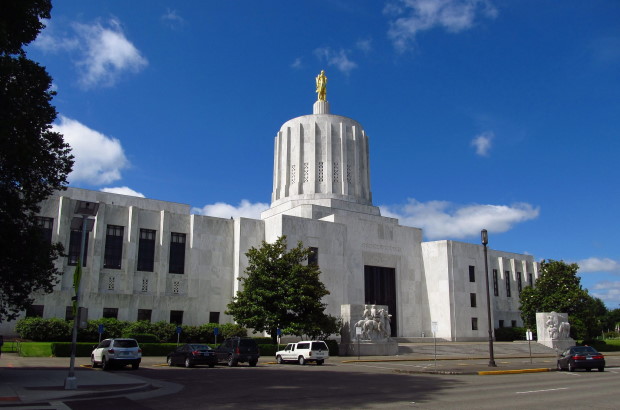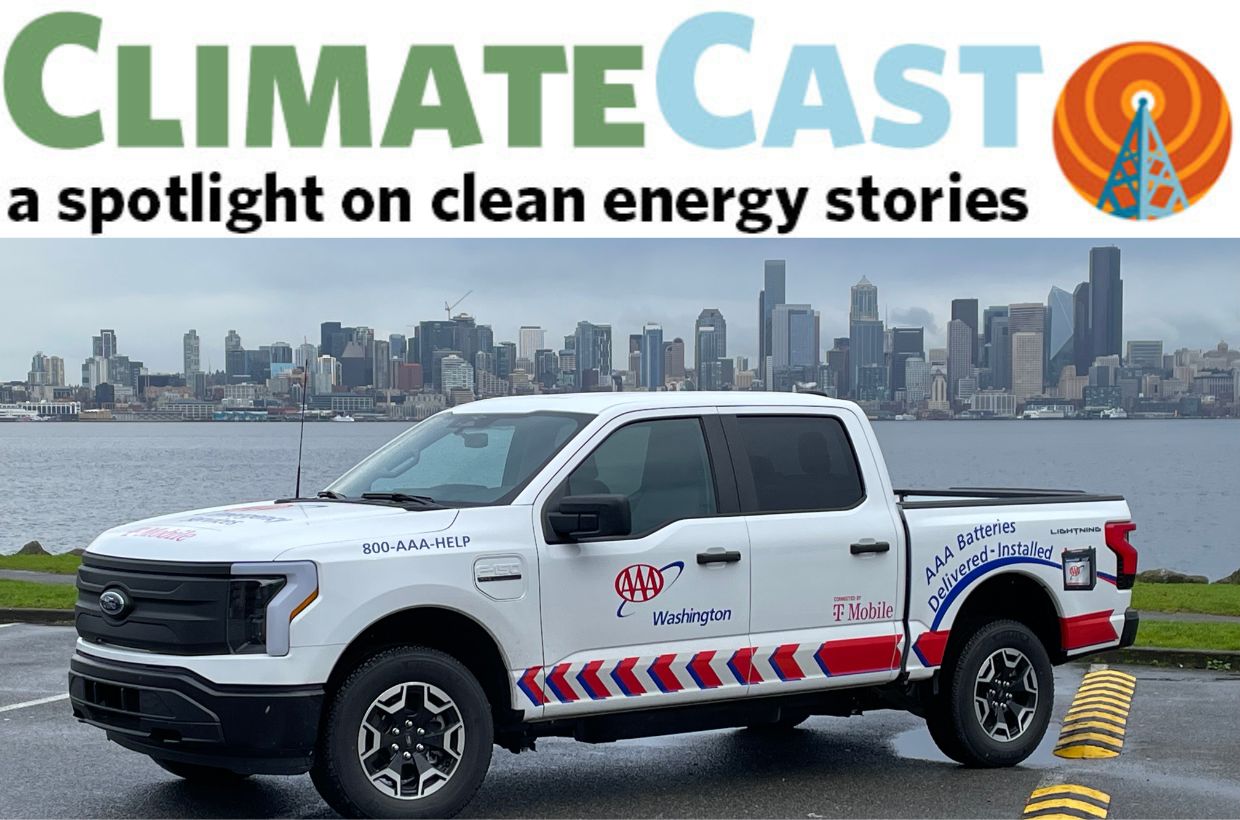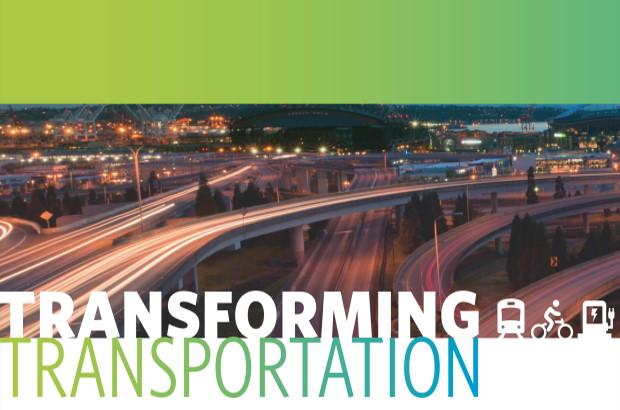
We all want clean, affordable, accessible, safe and efficient ways to get around. Our transportation systems are a crucial part of everyone’s lives. They enable us to see family and friends, go to work, and access essential services. When not at their best, these systems can also make it harder to do those things, and can in fact cause health and safety problems.
We all rely on transportation, and we must confront the fact that transportation fuels are responsible for well over a third of our climate and harmful air pollution in the Pacific Northwest—accounting for 39% of Washington’s annual greenhouse gas emissions and 35% of Oregon’s. Health professionals directly link this air pollution to asthma, lung cancer and other diseases. Due to racist public policies such as redlining and inner-city highway construction, toxic concentrations of diesel pollution in busy trucking corridors, bus depots, distribution hubs, and seaports disproportionately affect low-income and communities of color. Cleaning up transportation pollution will cut climate pollution, improving public health while addressing environmental racism in our transportation system.
Transitioning to electricity as a fuel
Shifting to zero-emission vehicles that get their power from clean energy is critical to cleaning our air and our transportation system. Achieving this vision means electrifying vehicles of all types and sizes, including but not limited to personal vehicles, medium- and heavy-duty trucks, construction and agriculture equipment, school and transit buses, and more.
TRUCKS AND BUSES. Medium- and heavy-duty vehicles account for a disproportionate amount of climate and air pollution in both Oregon and Washington. In Oregon, diesel trucks, buses, and delivery vans currently pump out 70% of smog pollution (NOx), 64% of black carbon, and nearly half (42%) of climate pollution from our transportation sector, yet they’re fewer than 10% of all vehicles on the road. The numbers are similar in Washington: though these vehicles are only about 10% of those on the road, they account for 30% of climate pollution from transportation, 50% of particulate matter pollution, and 60% of NOx pollution.. Getting zero-emission trucks on the road is a public health imperative, which is why we need to invest rapidly in cleaning up the delivery trucks, transit and school buses, big rigs and other large vehicles that drive on our highways and through our neighborhoods. Replacing dirty diesel-powered trucks with their zero-emission counterparts (battery electric and, in certain use cases, electrolytic hydrogen fuel cell) can clean the air we breathe, reduce climate emissions, and create green jobs.
CARS. Our personal vehicles need to be clean as well—otherwise, we simply will not achieve our climate goals. Electrifying our cars has benefits beyond protecting our climate; it will cut air pollution, improve health, and significantly reduce our ongoing transportation costs. Electric vehicles cost far less to fuel—approximately $1/gallon equivalent when compared with gas-powered cars. They also require less maintenance. Both Washington and Oregon have adopted the Advanced Clean Cars II policy which requires that all passenger vehicles sold by model year 2035 are zero-emission. It is essential that everyone who needs to drive is able to access an electric vehicle and charging, no matter whether they rent, live in an apartment, or are lower-income. Therefore, we must continue to advocate for increased public charging and targeted vehicle incentives.
MARINE VESSELS. If viewed as a country, the marine sector would be the 6th largest contributor to global climate pollution, about 3% of global greenhouse gas (GHG) emissions. Recent figures of the global marine industry estimate that more than 60,000 commercial vessels are moving 11 billion metric tons of cargo annually. Left unchecked, global shipping pollution is projected to increase by 20-50% between 2008 and 2050 in business-as-usual scenarios. State-based approaches to marine emissions exist. Thanks to the state’s powerful influence in being able to set vehicle emission standards that are stronger than the federal government’s, California has been leading the way in targeting marine pollution through policies that require large commercial vessels to use electric shore power and burn a lower sulfur fuel.
AIRPLANES. Globally, aviation accounts for 3.5% percent of climate pollution, a figure that could triple by 2050 without concerted action to curb emissions. Accordingly, a comprehensive solution to the world’s climate predicament requires a strategy to reduce aviation’s carbon footprint. In addition to developing clean aviation alternatives, fueling aircraft with clean fuels is an imperative. Sustainable Aviation Fuel (SAF) is a cleaner-burning, lower-emitting fuel–to qualify for federal tax credits, it must reduce life-cycle emissions by 50%. SAF can be produced from waste products, such as used cooking oil. Electric airplanes may be an option, particularly for shorter routes; prototypes are under development, including in Washington. It will take concerted research and investments to transition aviation off of fossil fuels, but it is necessary.
Increasing clean, comfortable, and convenient transportation options
Climate Solutions’ original research for the Pacific Northwest shows that shifting basically all of our vehicles to run on electricity is essential—and this is backed up by other major national and international studies. That task becomes easier and leads to greater benefits if we also expand transportation options beyond individual vehicles. We need to make it possible to get around safely, accessibly, affordably, and efficiently by walking, riding a bike or scooter, and taking convenient, comfortable transit. People should also be able to live near where they work or their activities and needs, which requires ample housing in urban areas. Reducing the amount we need to drive to work and access essential services such as visiting the doctor or going to the grocery store not only reduces our climate pollution, but also cuts congestion, reduces car crashes, and increases our quality of life.
Priorities for Transportation Advocacy
Northwest states have seen transportation policy successes in the past few years. Both Oregon and Washington now have Clean Fuel Standards, which require a decrease in the carbon intensity of transportation fuels, promoting cleaner fuels, including electricity. Both states have also adopted the Advanced Clean Truck Rule and Advanced Clean Cars II, which require an increasing percentage of new vehicle sales to be zero-emission. All new passenger vehicle sales must be zero-emission by model year 2035.
Both states also need to continue investments in zero-emission vehicles, both through federal and state funding. While both states have passed significant legislation and rules in the past few years to accelerate adoption of electric vehicles, the medium- and heavy-duty sector (e.g., semi-trucks, buses, delivery trucks) is not nearly as far along the transition to electric as the light-duty sector (passenger cars). This is a critical transition to curb air pollution and improve health in our communities, as well as to reduce climate pollution. Recently, Washington and Oregon have allocated funds to incentivize the purchase of zero-emission medium- and heavy-duty vehicles and start to build out the needed charging infrastructure. We continue to work on investments in a comprehensive charging network and on programs that allow low-income people to access electric vehicles.
Land use policy plays a significant role in ensuring that people are able to live near services and where they work. We need more housing in urban areas; that means allowing more transit-oriented development, duplexes and triplexes, and other flexible housing types. The cost of building new housing should also not be inflated through unnecessary parking minimums or design review practices.
In addition to statewide policy solutions, we are working with local governments, transit districts, and utility providers to improve clean transportation options. Utilities can accelerate transportation electrification through their own investments in building more publicly accessible charging stations, promoting financial incentives for individual and fleet EV purchases, supporting electric transportation options and programs that are inclusive to community needs, and aiding encouraging transit agencies in buying zero-emission electric buses. Local governments can showcase leadership by transitioning their own fleets to zero-emission, by supporting safe walking and biking infrastructure, and by funding transit options.

Electric Vehicles, “Am I too Heavy?” No, you are perfect.
EVs can weigh more, but is that missing the forest for the trees?

Oregon’s New Energy Strategy Confirms the Path Forward: Clean, Affordable, Reliable
The long-awaited Energy Strategy report is here, providing a roadmap for a clean energy transition, and, with the first-of-its-kind climate executive order from Governor Kotek that directs swift implementation of the findings, a cleaner, reliable, and more affordable energy future is more possible than ever before.

Special Session Wrap-Up
Our north star is simple: we need to be investing in Oregon, not DOGE’ing essential safety, transit, and climate programs or discouraging the transition to clean transportation.

This hybrid electric ferry crosses the sound without a sound
Washington's first hybrid-electric ferry is in service! It's clean, it's quiet, and it's the future of ferry transportation in the Puget Sound.

Oregon’s 2025 Legislative Session: Climate Wins, Losses, and the Road Ahead
Oregon’s 2025 legislative session delivered mixed results for climate progress. Sound familiar? That’s because this is the second year in a row that Oregon lawmakers fell short of delivering the bold investments and climate action this moment demands. While we secured hard-fought wins and defended against serious threats that would unwind existing progress, this was far from a banner year for climate action in Oregon. Still, this session laid important groundwork, and we have a clear call to action for the road ahead.

When OR lawmakers dream about transportation, what do they see?
After months of collective advocacy and engagement—and just 20 days remaining in session—the Legislature released its long-awaited Transportation Reinvestment Package. Here’s the download on what’s in the bill (and what's not), and how you can help make sure that lawmakers deliver for climate in the final stretch.

Clean Air Shouldn’t Be Optional: Climate Investments should be in the Oregon Transportation Package
Everyday necessities shouldn’t come with everyday pollution. Yet the goods and resources we rely on are delivered by a freight system powered largely by diesel. This is bringing toxic emissions into our neighborhoods, schools, and lungs. Diesel pollution is not just an environmental issue, it’s a public health crisis, especially for children.

Calling In: Tell Oregon lawmakers to invest in our transportation future TODAY!
Right now, Oregon legislators are drafting a sweeping transportation funding package. Without major course correction, it will fail to meet our state’s climate and equity goals. Transportation is our state’s largest source of climate pollution. Yet the current transportation proposal does not include any investment in clean vehicles or charging infrastructure.

Drivers' access to national EV charging network threatened by rogue Trump action
Nonprofits sue Trump administration over illegal freeze of billions for EV charging. Plaintiffs include Climate Solutions, the Sierra Club, Earthjustice, NRDC (Natural Resources Defense Council), the Southern Environmental Law Center and others.

🚨 Breaking: Oregon Delays Clean Air Progress—Tell Legislators to Act Now
JUST IN: As of yesterday, the Oregon leaders decided on a major setback to clean air and climate progress. They announced a two-year delay to the state’s Advanced Clean Trucks (ACT) rule. This delay comes after relentless lobbying by Big Oil and national truck manufacturers—and it's our communities who will bear the consequences: more diesel pollution, more asthma, more climate harm.
Give for a brighter future
Connect
Join our email list to learn about what we do and how to get involved.
Don't miss
TRANSFORMING TRANSPORTATION
• Our report: Transforming Transportation: How to cut our pollution and achieve our climate goals in Washington and Oregon
• Pathways to cut pollution
• Are we ready to handle all-electric transportation?

